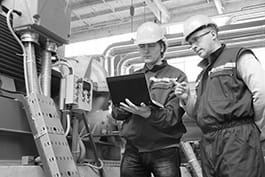Profession power production plant operator

Power production plant operators control, operate and maintain machinery to generate electric power.
Power production plant operator Jobs: Open positions
Find the job of your dreams on Talent.com, one of the largest job sites worldwide.
Job postings: talent.comPersonality Type
Tasks power production plant operator
- Control and monitor boilers, turbines, generators and auxiliary equipment in power-generating plants.
- Control the flow of electricity from a central point by operating and monitoring valves, switches and gauges.
- Control processes and equipment for managing by-products.
- Coordinate and schedule power loads and line voltages.
- Compile records and reports, e.g. on equipment performance, instrument readings and switching operations.
- Control and maintain auxiliary equipment, such as pumps, fans, compressors, condensers, feed water heaters, filters and chlorinators, to supply water, fuel, lubricants, air and auxiliary power.
- Clean and lubricate equipment such as generators, turbines, pumps and compressors.
- Communicate with systems operators, e.g. to regulate and coordinate transmission loads and frequencies, and line voltages.
- Start or stop generators and connect or disconnect them to and from circuits.
- Respond to emergencies such as fire and environmental hazards.
Related professions utilities
- Drinking water treatment plant operator
- First line supervisor utilities workers
- Meter reader utilities
- Power systems engineer
- Waste water plant operator
- Water well driller
Knowledge
- Automation technology
Set of technologies that make a process, system, or apparatus operate automatically through the use of control systems.
- Electric current
Flow of electric charge, carried by electrons or ions in a medium such as an electrolyte or a plasma.
- Electrical power safety regulations
The compliance with safety measures which need to be taken during the installation, operation, and maintenance of constructions and equipment which function in the generation, transmission, and distribution of electrical power, such as the appropriate safety gear, equipment handling procedures, and preventive actions.
- Electric generators
The principles and operations of devices that can convert mechanical energy into electrical energy, such as dynamos and alternators, rotors, stators, armatures, and fields.
- Mechanics
Theoretical and practical applications of the science studying the action of displacements and forces on physical bodies to the development of machinery and mechanical devices.
- Electricity
Understand the principles of electricity and electrical power circuits, as well as the associated risks.
Skills
- Wear appropriate protective gear
Wear relevant and necessary protective gear, such as protective goggles or other eye protection, hard hats, safety gloves.
- Monitor electric generators
Monitor the operation of electric generators in power stations in order to ensure functionality and safety, and to identify need for repairs and maintenance.
- Resolve equipment malfunctions
Identify, report and repair equipment damage and malfunctions; communicate with field representatives and manufacturers to obtain repair and replacement components.
- Monitor automated machines
Continuously check up on the automated machine's set-up and execution or make regular control rounds. If necessary, record and interpret data on the operating conditions of installations and equipment in order to identify abnormalities.
- Maintain power plant machinery
Maintain and repair power plant machinery and equipment to prevent operational problems and ensure all machines perform sufficiently.
- Maintain electrical equipment
Test electrical equipment for malfunctions. Take safety measures, company guidelines, and legislation concerning electrical equipment into account. Clean, repair and replace parts and connections as required.
- Conduct routine machinery checks
Check machinery and equipment to ensure reliable performance during use and operations in worksites.
- Use remote control equipment
Use a remote control to operate equipment. Watch the equipment closely while operating, and use any sensors or cameras to guide your actions.
- Ensure equipment maintenance
Ensure that the equipment required for operations is regularly checked for faults, that routine maintenance tasks are performed, and that repairs are scheduled and performed in the case of damage or flaws.
- Respond to electrical power contingencies
Set in motion the strategies created for responding to emergency situations, as well as respond to unforeseen problems, in the generation, transmission, and distribution of electrical power, such as power outages, in order to rapidly solve the problem and return to normal operations.
Optional knowledge and skills
operate automated process control renewable energy technologies perform minor repairs to equipment electricity consumption control temperature inspect wind turbines arrange equipment repairs ensure compliance with electricity distribution schedule hydroelectricity fossil fuels types of wind turbines operate steam turbine ensure safety in electrical power operations biomass conversion operate hydraulic machinery controls develop strategies for electricity contingencies liaise with engineers nuclear energy operate boiler maintain records of maintenance interventionsSource: Sisyphus ODB